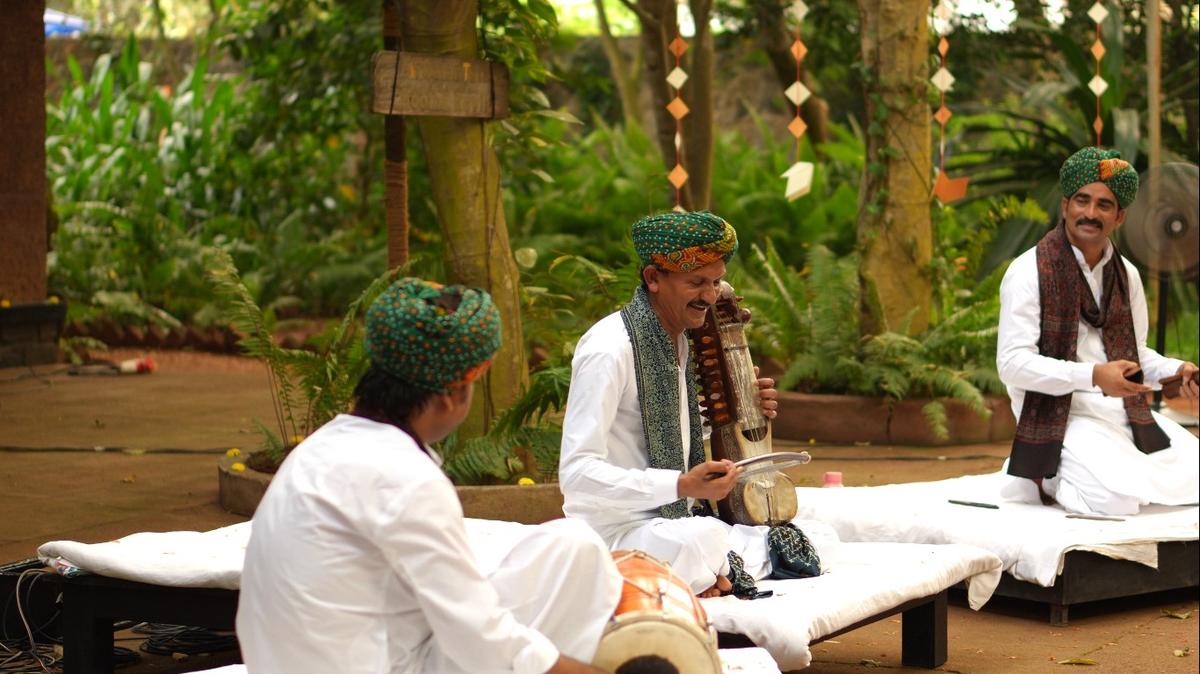Sadiq, Asin and Zakir
| Photo Credit: Courtesy: SAZ
The music of Rajasthani folk band, SAZ (an acronym for Sadiq, Asin and Zakir), inhabits spaces between the traditional and the contemporary. Their original compositions create much curiosity among community elders and musical mentors in the village. Urban listeners (who encore and keep them on stage for way longer than planned) may observe that SAZ’s music, while rooted in their milieu and regional folk music vocabulary, takes off from fresh viewpoints.
Interacting after two performances and a workshop at Adishakti Theatre’s Remembering Veenapani Festival, held recently, the band members spoke about how the story of their original music is entwined with the story of their band’s creation. “Divya Saab (Divya Bhatia, curator of Jodhpur RIFF) sent us to China around the end of 2019. We never thought we would become a band. They both (Sadiq and Asin) had worked together earlier. I had played with Asin earlier but the three of us had never performed as a team. We did our riyaaz and performed two shows every day for a week,” says Zakir Khan Langa, whose dextrous khartal playing is as well received as his singing.
Asin Khan, exponent of the Sindhi Sarangi, an Aga Khan awardee and evocative singer, says, “Sadiq and I felt something clicked when we three performed as a team. We got to know each other’s musical styles over that trip.”
Back in India, they played one concert in Mumbai and were told they might go to China again but what followed was a long and uncertain pause because of the pandemic. In 2021, when things opened a bit, they were at a meeting with Divya Bhatia, when he asked them if they had given thought to working together. Divya would become, not just the producer of their band, but also a close collaborator and mentor. While they welcomed the prospect of working together, they were shocked when Divya put the onus of shaping the band on them, even telling them to write new songs.
Says Zakir, “None of us has ever written our own songs.” Adds Asin, “We felt we already have so many songs. Why should we write?” Sadiq Khan, the band member who draws melody with finesse from his chosen percussion — the dholak, recalls that after the initial resistance, they understood that they could not emerge as a band unless they found their signature music.

The band performing at the Remembering Veenapani Festival
| Photo Credit:
Courtesy: Adishakti
While Divya co-writes and puts the arrangements in place, the trio ideate, create the storyline, find words and compose the tune together. Divya makes them dig deeper and find a more wholesome representation of the story that is the starting point of the song in their music, because — in the words of the band, “our songs begin in a story.”
Asin explains, “There is no raag, raagini or sa-re-ga-ma in folk music. A raag, if present, is usually a story. Like Surut is the story of a Maharani. Every song has a story. Every raag is a story. They used to tell us the stories and the music would be learnt by listening.” Though the names of raags like Surut and Khamach come up, “they are not an exact match with classical raags,” adds Sadiq. “Folk music is from ancient times and the bhaav of raags was coded into the music in those times,” says Zakir. Being musicians who play by ear, the musical expression of SAZ is unfettered by theoretical approaches. Though they never learnt through structure, having performed with a host of international and local musicians, across genres in different parts of the world, they can work with the terminologies of western and Indian classical music.
SAZ members play multiple instruments and sing. If the online popularity of their original composition ‘Sundar gori re’ is anything to go by, the music of SAZ is hitting all the right notes.
Published – May 15, 2025 05:06 pm IST